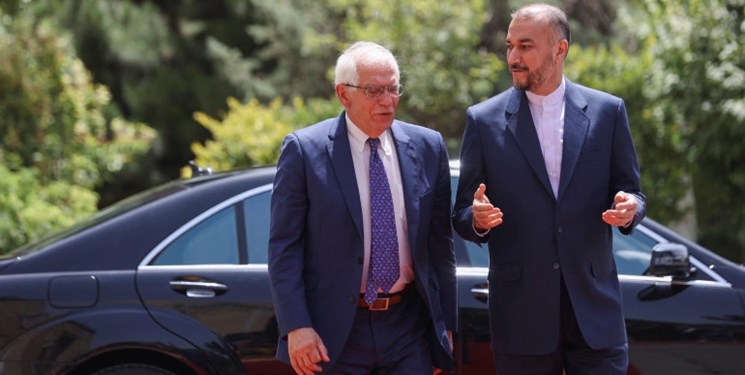Iran: US Should Set Aside Excessive Demands, Doubts in Nuclear Talks
Iranian Foreign Minister Hossein Amir Abdollahian said that negotiations aimed at the removal of anti-Tehran sanctions would lead to an agreement if the US refrained from raising excessive demands and lay aside its doubts, adding that Washington needs to adopt a realistic view.

Amir Abdollahian made the remarks in his phone conversation with the EU High Representative for Foreign Affairs and Security Policy Josep Borrell on Monday night. The two sides views on the latest developments in talks to lift sanctions on Iran, as well as some important regional and international issues of mutual interest.
“There is no doubt in the government of the Islamic Republic of Iran’s determination to reach a good, strong and lasting agreement,” Amir Abdollahian stated.
The foreign minister apparatus expressed gratitude to Borrell and EU Deputy Foreign Policy Chief Enrique for their continuous efforts.
“The White House should put aside its excessive demands and doubts and realistically step in the path of finding a solution and reaching an agreement and stop repeating the past ineffective approach and unproductive behavior and resorting to pressure and sanctions as leverage,” he stressed.
Borrell, for his part, appreciated the positive and serious will of the Iranian side in the negotiation process so far.
He also emphasized the necessity of presenting and summarizing the ideas of the parties in the current situation.
“I will continue to try to bring the views of Iran and the United States closer together and reach a point of agreement,” he continued, and stated, “I believe months of efforts should lead to a result.”
Iranian officials say the ball is now in Washington’s court, and it is the administration of US President Joe Biden that must take action to redress Donald Trump’s illegal moves.
Iran and the five remaining parties to the nuclear deal, officially known as the Joint Comprehensive Plan of Action (JCPOA), have held several rounds of negotiations in the Austrian capital of Vienna since April last year to restore the agreement, which was unilaterally abandoned by Trump in May 2018.
In quitting the agreement, Trump restored sanctions on Iran as part of what he called the “maximum pressure” campaign against the country. Those sanctions are being enforced to this day by the Biden administration, even though it has repeatedly acknowledged that the policy has been a mistake and a failure.
Mora coordinated indirect negotiations between Iran and the US in Qatar’s Doha in late June aimed at resolving the differences hindering the revival of the 2015 agreement.
Iran has blasted the US for insisting on previous positions during the Doha talks, stressing that the path of diplomacy is still open.
In a joint press conference with his Qatari counterpart Mohammad bin Abdul Rahman Al Thani in Tehran in early July, Amir Abdollahian blamed Washington for failure in arriving at a deal in Doha talks, and refuted the US claim that Iran’s negotiators have raised demand irrelevant to the nuclear deal in the negotiations.
He added that the US reluctance to provide the needed guarantees for Iran’s continued economic interests under the deal is the main cause of prolonged talks.







